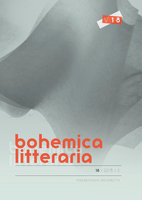Growing Up with (Ir)Replaceable Parents: Neil Gaiman’s The Day I Swapped My Dad for Two Goldfish, Coraline, and The Graveyard Book
Growing Up with (Ir)Replaceable Parents: Neil Gaiman’s The Day I Swapped My Dad for Two Goldfish, Coraline, and The Graveyard Book
Author(s): Marek OziewiczSubject(s): Psychology, Fiction, Social Philosophy, Philosophy of Mind, British Literature
Published by: Masarykova univerzita nakladatelství
Keywords: Neil Gaiman; parent-child relationship; child development; identity formation; vicarious literary experience; desire; The Day I Swapped my Dad for Two Goldfish; Coraline; The Graveyard Book;
Summary/Abstract: One of the most popular fantasy authors today, Neil Gaiman has been notorious for representing children’s ambivalent perceptions of parents and creating stories based on a child’s fantasies of replacing parents with better or kinder ones. This essay offers a reading of The Day I Swapped my Dad for Two Goldfish (1998/2004), Coraline (2002), and The Graveyard Book (2008) as narratives in which this desire is sublimated, allowing the young reader to vicariously experience the empowerment and the danger that accrue from replacing, getting rid of, or exchanging one’s parents. I demonstrate that in each of the three books Gaiman confirms the child’s perception of parents as potentially replaceable, but suggests that this awareness serves a vital developmental purpose. First, it helps the child protagonist outgrow dependence on the parents and, often in rebellion to them, begin to move toward emotional and psychological independence. Second, it leaves the protagonists with a more mature understanding of the parent-child relationship – a realization that the agency they seek is spurious when achieved by finding parents who would cater to all of one’s desires. In struggling to come to terms with their parents’ limited availability and imperfections, Gaiman’s protagonists learn that lasting human relationships are built not in the absence of but despite our own and other people’s shortcomings.
Journal: Bohemica litteraria
- Issue Year: 18/2015
- Issue No: 2
- Page Range: 83-98
- Page Count: 16
- Language: English

